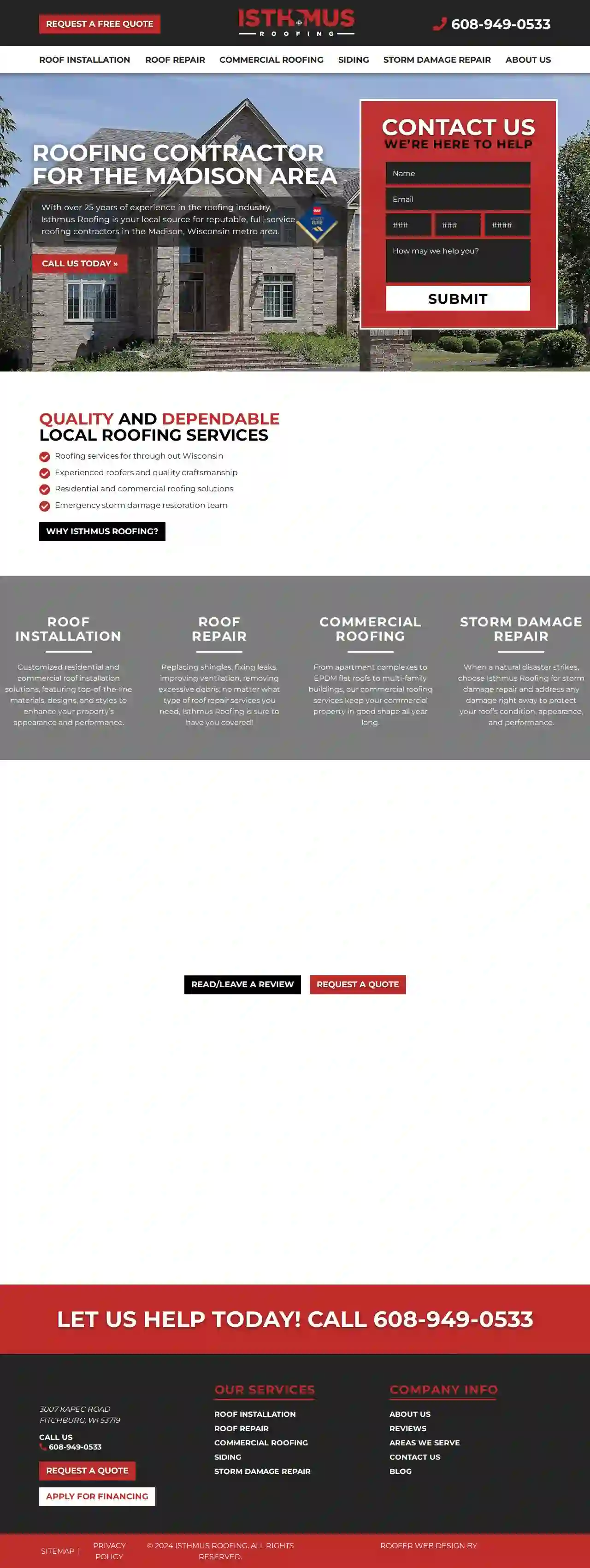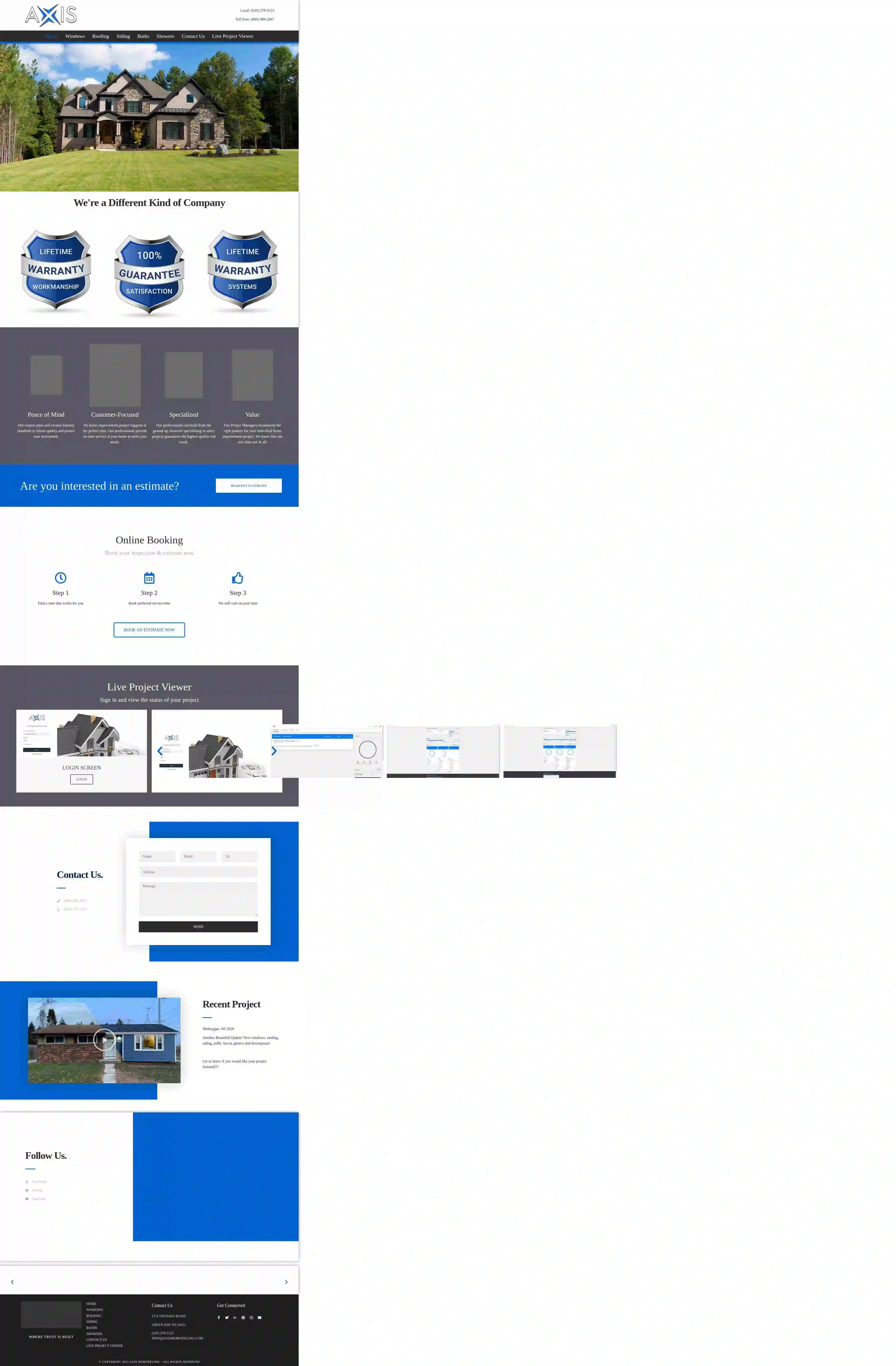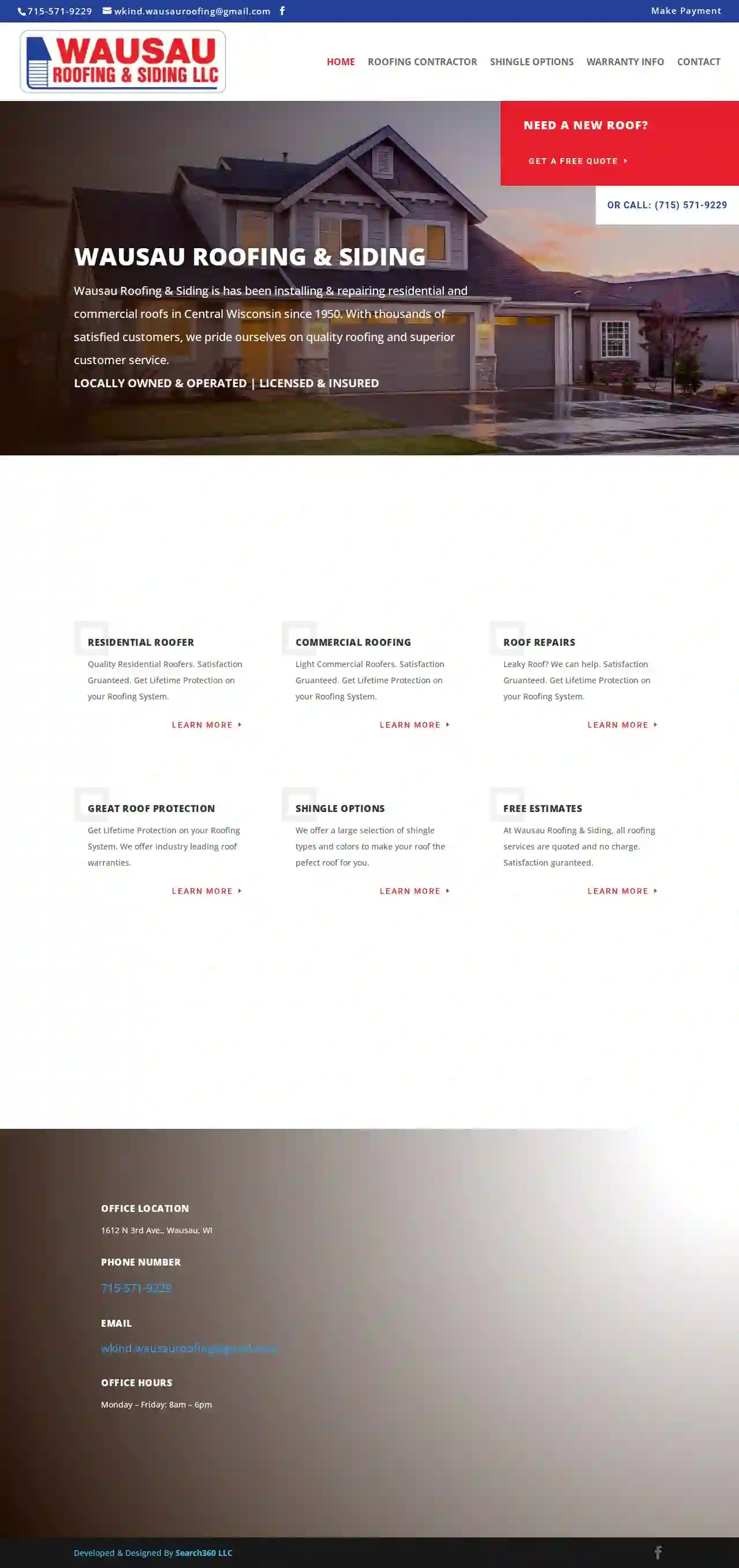Roofing Companies Prairie du Chien
Top Roofers in Prairie du Chien
Get 3 FREE Roofers quotes for your project today! Compare profiles, reviews, accreditations, portfolio, etc... and choose the best service.

Semper Fi Roofing & Exteriors
4.8565 reviews820 Swan Drive, Mukwonago, 53149, USAt Semper Fi Roofing, we're committed to providing top-notch roofing services to our customers. With years of experience and a team of skilled professionals, we're dedicated to keeping you safe, warm, and dry. Our commitment to the community is evident in our involvement in various charitable initiatives and our dedication to providing exceptional customer service. Contact us today to schedule a free, no-obligation in-home quote and experience the Semper Fi difference.
- Services
- Why Us?
- Accreditations
- Gallery
Get Quote
Isthmus Roofing
585 reviews3007 Kapec Road, Fitchburg, 53719, USWith over 25 years of experience in the roofing industry, Isthmus Roofing has been proud to provide the Madison, Wisconsin area with reputable, professional roofing contractor services. We’ve spent decades building up our reputation as a locally owned and operated enterprise, committed to offering our Wisconsin residential clients the utmost customer service possible. When you need fast, efficient, and accommodating roofing and home exterior maintenance assistance, contact Isthmus Roofing today! To put it simply, roofing repair and installation is what we do. We take pride in seeing our finished work throughout the state of Wisconsin . Once our job is done, we don’t consider our clients to be customers anymore; from now on, they’re neighbors.From proficient roof repair and installation services to commercial roofing projects and siding to storm damage repair, our team of certified and experienced roofing specialists will keep you informed every step of the way throughout our exterior maintenance process, so you can rest assured that your property is in good hands. While our hard work and dedication have helped us continue doing what we love doing, it’s our loyal customers that keep us coming back for more.
- Services
- Why Us?
- Testimonials
- Gallery
Get Quote
Anderson Roofing LLC
53 reviewsGreen Bay, USAnderson Roofing LLC is a locally owned and operated roofing company serving Green Bay, WI for over 30 years. We specialize in a wide range of roofing services, including roof replacement, repair, asphalt, metal, rubber, and cedar roofing. In addition to roofing, we also offer siding, gutters, gutter covers, fascia, and soffit services. We pride ourselves on providing our customers with high-quality workmanship, competitive pricing, and exceptional customer service. Our team of experienced professionals is dedicated to ensuring your complete satisfaction. We offer a lifetime workmanship warranty on all our services, giving you peace of mind knowing your investment is protected.
- Services
- Why Us?
- Gallery
Get Quote
Axis Remodeling
4.453 reviews1711 Ontario Road, Green Bay, 54311, USAt AXIS REMODELING, we're a different kind of company. We specialize in windows, roofing, siding, baths, and showers, and our experts meet and exceed industry standards to ensure quality and protect your investment. We're customer-focused, providing on-time service at your home to meet your needs. Our professionals can build from the ground up, but we specialize in select projects to guarantee the highest quality end result. We value our customers and know that one size does not fit all, so our Project Managers recommend the right product for your individual home improvement project.
- Services
- Why Us?
- Gallery
Get Quote
Overhead Solutions Inc
4.9392 reviews2368 E Deerfield Ave., Suamico, WI, 54173, USOverhead Solutions, Inc. is more than just a roofing and construction company; we're a dedicated team committed to bringing real growth to our community. We consistently deliver better roofs to happier clients in Green Bay, Appleton, and throughout Wisconsin!
- Services
- Why Us?
- Accreditations
- Our Team
- Testimonials
- Gallery
Get Quote
Recovery Restorations General Contracting
530 reviewsNeenah, USAt Recovery Restorations General Contracting, we offer residential roofing services that stand the test of time. From repairs to replacements, our experienced team is committed to delivering high-quality work with attention to detail, ensuring you are happy with the final result. We’re not done until you’re completely satisfied. Established in 2020, Recovery Restorations General Contracting serves not only Neenah, WI but the entire Fox Valley Area, bringing over 35 years of combined experience to provide top-tier roofing services. What sets us apart from our competitors? Our meticulous attention to detail, unwavering commitment to customer satisfaction, and, last but not least, our status as the preferred contractor for Owens Corning. Being steadfast in guaranteeing our client’s satisfaction, we provide a 10-year workmanship warranty to underscore our dedication to quality service. Our team believes in prompt communication so we always get back to inquiries within an hour during business hours. We offer top-notch and comprehensive services to meet all residential roofing needs from Roof Repair, Roof Replacement, Siding Repair, Siding Replacement, to Storm Damage.
- Services
- Why Us?
- Accreditations
- Gallery
Get Quote
Paramount Roofing and Siding, LLC
4.854 reviewsMilwaukee, USParamount Roofing provides the quality and expertise you look for in a roofing contractor. We are proud to provide Madison, WI and surrounding areas with roofing that will last a lifetime. For over 25 years, Paramount Roofing & Siding has been providing Madison WI and surrounding areas with affordable roofing, and quality roofing that will last a lifetime. We are a Madison WI roofing contractor and siding contractor specializing in residential asphalt shingle roof installation. We have highly experienced installers for Mulehide EPDM rubber roofing. From small porch roofs to large shopping malls, we’ve done them all. Our mission is to ensure our clients make an informed choice when considering roofing or siding options. We offer a variety of roofing and siding materials to choose from, and our team of experts will work with you to find the best solution for your needs and budget.
- Services
- Why Us?
- Accreditations
- Gallery
Get Quote
Swift Roofing LLC
4.992 reviews4551 N 125th St, Butler, USSwift Roofing is a family owned and operated company established in 2015. We strive for excellence when taking on any project we are presented with. Customer service and satisfaction are at the top of our list when delivering a finished product to all of our customers. We are honest, reliable, and committed to giving your home a look that you and your family can enjoy for years.
- Services
- Why Us?
- Our Team
- Testimonials
- Gallery
Get Quote
Over the Top Roofing and Construction
3.868 reviews436 Oakton Ave, Pewaukee, WI, 53072, USSpecialties in Roofing, Gutters, Siding, & Construction TRUSTED VALUE. CUSTOM SOLUTIONS. Trust the integrity and appearance of your home or business – and everything it protects – to our experienced professionals. No Matter the scope of the job, our quality workmanship & attention to detail ensure your investment is a lasting one. We guarantee it. GET FINANCING OUR SERVICES Roofing Contractors Gutter Repair & Installation Residential Contruction Sliding Installation Chimney Services Insulation Installation Masonry Services Financing Services GET A QUOTE TODAY What our clients say “I contacted Over The Top to have a new roof installed which included taking off the existing roof. They responded timely and provided a written quote after a discussion with them on type of materials to be used. They made solid recommendations. They followed up on the quote in person. Answered all my questions and was constantly selling value. They committed to a date and how long it would take to do the job. At this point, I would highly recommend them David is who we dealt with and was extremely professional in all aspects. Great experience.” G.F., Roofing “They are amazing. We had some roof damage. When my home was built, the roof was supposed to have a membrane that kept the snow from leaking into the house, and it was not put down. This company came in and did this for me. They are very easy to work with, they did not have high-pressure sales. They were concerned with what was right for my home and me as a customer. We were referred to them by another service provider we’d used previously.” P.G., Roofing GET A QUICK FREE ROOFING QUOTE "*" indicates required fields Name* Email* Phone Number* Subject* Address* Message* CAPTCHA Email
- Services
- Why Us?
- Our Team
- Testimonials
- Gallery
Get Quote
Wausau Roofing & Siding LLC
3.84 reviews1612 N 3rd Ave., Wausau, WI, USWausau Roofing & Siding is a locally owned and operated roofing company serving Central Wisconsin since 1950. We specialize in residential and commercial roofing, offering a wide range of services including installations, repairs, custom builds, and more. With thousands of satisfied customers, we pride ourselves on quality workmanship and superior customer service. We are licensed and insured, and we offer lifetime protection on our roofing systems.
- Services
- Why Us?
- Gallery
Get Quote
Over 17,196+ Roofing Contractors on our platform
Our roofing pros operate in Prairie du Chien & surrounding areas!
Roofyng.com has curated and vetted the Best Roofers in and around Prairie du Chien. Find a top & trustworthy pro today.
Frequently Asked Questions About Roofing Companies
- Sagging or Pulling Away: Gutters that are sagging, pulling away from the house, or visibly damaged need repairs or replacement.
- Overflowing Water: If water overflows during rain, it indicates clogs or inadequate drainage.
- Visible Debris: Leaves, twigs, and other debris accumulated in the gutters obstruct water flow.
- Water Damage: Water stains or damage to siding or foundation near the gutters suggest overflow.
- Plant Growth: Plants or moss growing in the gutters indicate standing water and the need for cleaning.
- Clear the Area: Remove any vehicles, outdoor furniture, or other items from around your house to provide the roofing crew with easy access.
- Protect Landscaping: Cover plants, shrubs, and other landscaping elements near the house with tarps or plastic sheeting to protect them from falling debris.
- Clear the Attic: Remove or cover items stored in your attic, as dust and debris might fall through during the removal of the old roof.
- Notify Neighbors: It's courteous to inform your neighbors about the upcoming roof replacement project, especially if it's likely to be noisy or disruptive.
- Discuss Logistics with the Contractor: Coordinate with the roofing contractor regarding access to your property, parking arrangements, and any special instructions or concerns you have.
- Asphalt Shingles: 20-30 years
- Metal Roofing: 40-70 years
- Tile Roofing: 50-100 years or more (clay and slate)
- Flat Roofing: 15-30 years (depending on material)
- Slate: 100 years or more
- Wood Shakes or Shingles: 30-50 years (with proper maintenance)
How can I tell if my gutters need to be cleaned or repaired?
How do I prepare for a roof replacement?
What is fascia, and why is it important?
How long does a roof typically last?
How can I tell if my gutters need to be cleaned or repaired?
- Sagging or Pulling Away: Gutters that are sagging, pulling away from the house, or visibly damaged need repairs or replacement.
- Overflowing Water: If water overflows during rain, it indicates clogs or inadequate drainage.
- Visible Debris: Leaves, twigs, and other debris accumulated in the gutters obstruct water flow.
- Water Damage: Water stains or damage to siding or foundation near the gutters suggest overflow.
- Plant Growth: Plants or moss growing in the gutters indicate standing water and the need for cleaning.
How do I prepare for a roof replacement?
- Clear the Area: Remove any vehicles, outdoor furniture, or other items from around your house to provide the roofing crew with easy access.
- Protect Landscaping: Cover plants, shrubs, and other landscaping elements near the house with tarps or plastic sheeting to protect them from falling debris.
- Clear the Attic: Remove or cover items stored in your attic, as dust and debris might fall through during the removal of the old roof.
- Notify Neighbors: It's courteous to inform your neighbors about the upcoming roof replacement project, especially if it's likely to be noisy or disruptive.
- Discuss Logistics with the Contractor: Coordinate with the roofing contractor regarding access to your property, parking arrangements, and any special instructions or concerns you have.
What is fascia, and why is it important?
How long does a roof typically last?
- Asphalt Shingles: 20-30 years
- Metal Roofing: 40-70 years
- Tile Roofing: 50-100 years or more (clay and slate)
- Flat Roofing: 15-30 years (depending on material)
- Slate: 100 years or more
- Wood Shakes or Shingles: 30-50 years (with proper maintenance)